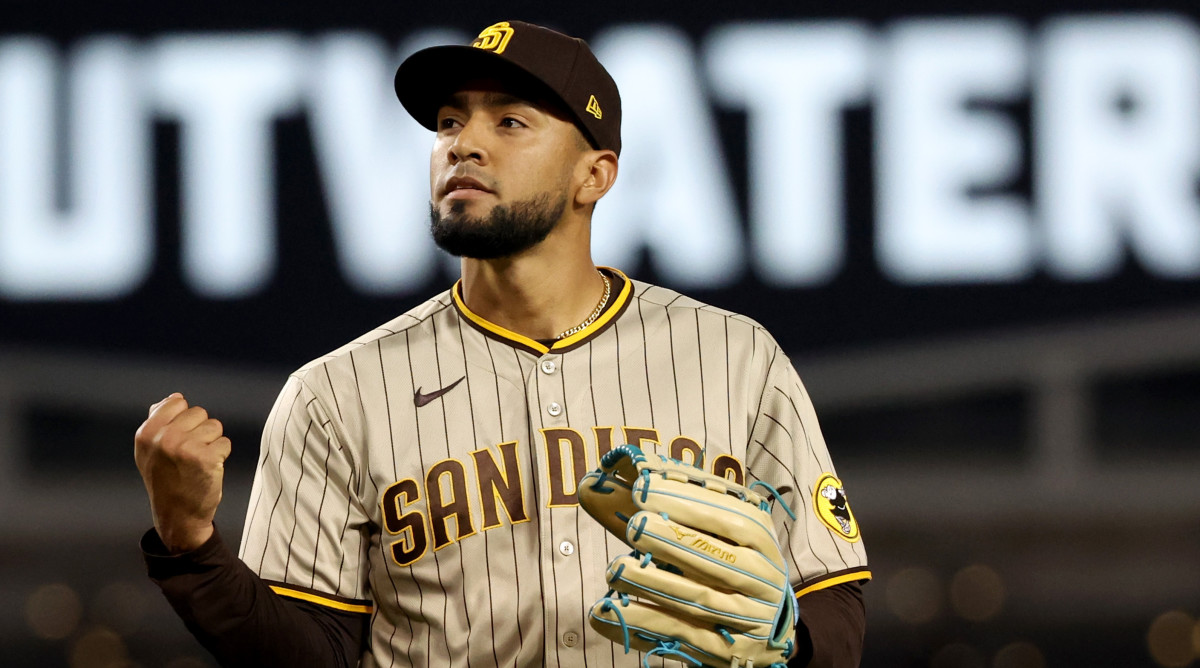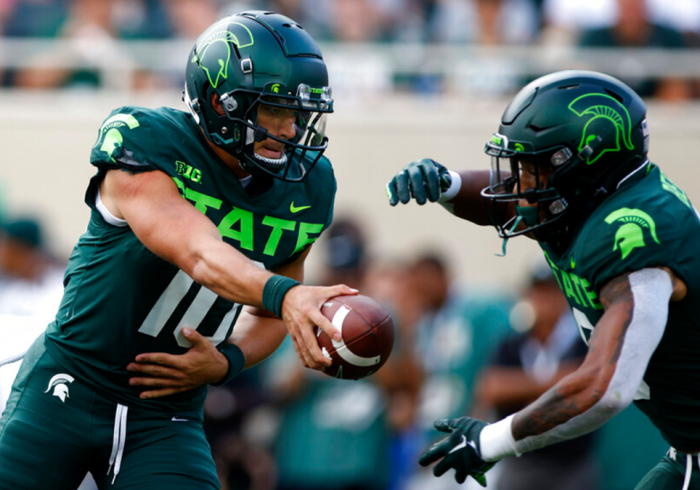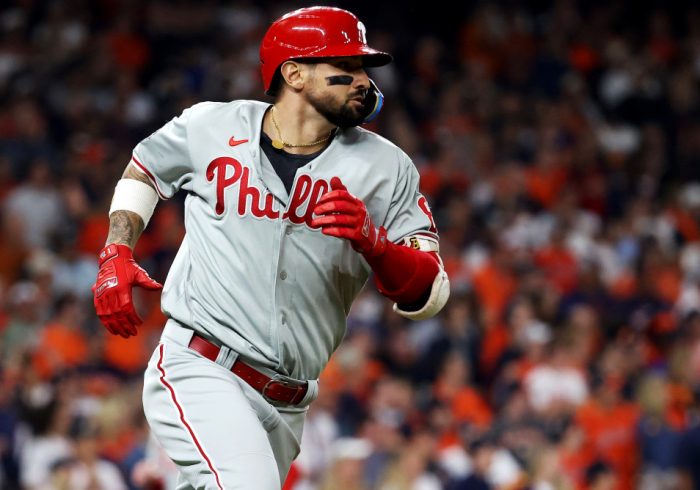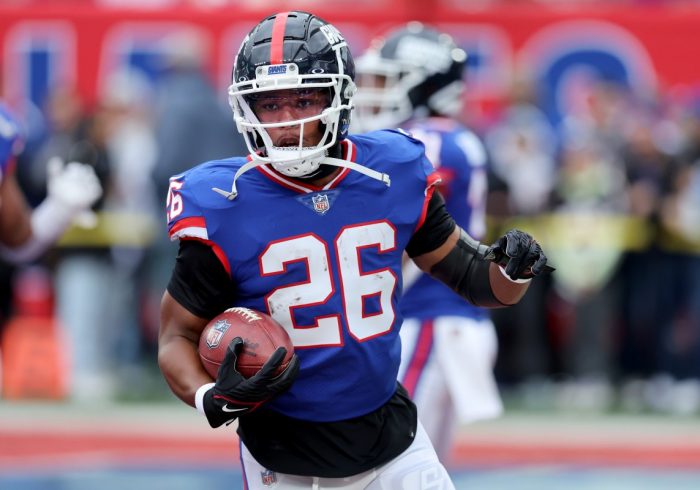LOS ANGELES — More than Clayton Kershaw and Yu Darvish coughing up hits and leads, more than Josh Hader returning to the mound for a second inning, and even more than a goose in the outfield taking a gander at a thrill ride of a baseball game, the oddest moment of San Diego’s NLDS Game 2 win Wednesday night was the pitch from a 31-year-old rookie that might have saved the Padres’ season.
The oddity wasn’t just that Robert Suárez happened to be in this seventh inning jam in the first place. Suárez is a righthander who did not make his pro debut until he was 24, leaving semipro ball and a construction job in Venezuela to pitch for Saraperos de Saltillo of the Mexican League, the start of a strange seven-year international journey to this Dodger Stadium predicament.
The oddity was that Suárez threw a 1-and-0 changeup to Trea Turner at the most dangerous possible moment: runners at second and third and one out with the Padres clinging to a 4–3 lead. Suárez had not thrown a 1-and-0 changeup to a righthanded hitter all year.
The situation was so bleak for San Diego that Padres manager Bob Melvin played his middle infielders back, conceding the tying run while simply trying to ward off the go-ahead run from scoring. If Turner put the ball in play, just about the only way the game would not be tied would be a groundball to a corner infielder.
Yep. That’s exactly what happened. Turner grounded out to third on that strange changeup, which was out of the zone. After Melvin smartly ordered Freddie Freeman walked, Suárez ended the inning by getting Will Smith on a line drive to center—on a 2-and-2 changeup.
The entire night was a changeup. Little brother rose up and beat his older brother in driveway hoops. San Diego beat L.A, 5–3, for its first-ever playoff win over their division rivals. And now the Padres—losers of 15 of 20 previous games against the Dodgers this year—control the series. It has become a best-of-three, with the next two games in San Diego, the first playoff games there in front of fans since Oct. 5, 2006, which was so long ago the Dodgers’ manager, Dave Roberts, was the Padres’ leadoff hitter.
“It’s probably as back and forth a game as you are going to see,” Melvin said. “A lot of drama to it. Fun win.”
Melvin managed a gem of a game, especially asking Hader to get four outs for the first time in two years. Melvin has used six different relievers to cover 9 1/3 innings in this series and none of them has allowed a run—none more spectacularly than Suárez.
Before his escape artistry in the seventh, Suárez bailed out Darvish from two inherited runners by striking out Justin Turner on a 101-mph heater and then—with that changeup—getting Gavin Lux to ground into a double play.
Suárez has a nasty, low-spinning and hard changeup—batters hit .089 against it—that he throws only 10% of the time to righthanders.
There is nothing usual about his pitches or his story. Suárez took the gig in Mexico in 2015 after a buddy suggested the Mexican League paid well. He pitched well enough to land a job in Japan, where he blew out his elbow, returned as a starter, pitched poorly, got released and returned as closer, which earned him a contract from the Padres last December. At 31, he signed with a major league organization for the first time.
Melvin asked Suárez to close Opening Day in Arizona. It did not go well: walk, walk, wild pitch, hit batter. Melvin replaced him with Craig Stammen, who threw a wild pitch and gave up a walk-off homer to Seth Beer on National Beer Day.
But Suárez recovered to post an extraordinary season. His strikeout rate of 11.5 per nine innings was fifth-best among first-year pitchers with at least 40 innings.
“He has really pitched himself into as prominent role as we have,” Melvin said.
In addition to getting locked down by the San Diego bullpen, the Dodgers sabotaged their own cause. In a game of defensive highlights, an error by Trea Turner on a grounder in the sixth preceded a tie-breaking single by Jurickson Profar off a game but ineffective Kershaw.
“I thought he might have been a little too quick,” Roberts said of Turner’s misplay. “You’re not going to double the guy up. So just to get the lead runner was really important, and I just think that the exchange wasn’t good.”
Suddenly, the Dodgers are in trouble. They were 22 wins better than the Padres in the regular season. If the Padres should win the series, by virtue of the gap of .136 winning percentage points, it would be the second-biggest upset in postseasons following full seasons, exceeded only by the 1906 White Sox beating the Cubs (.147 differential).
The Padres have Blake Snell and Joe Musgrove lined up as starters against Tony Gonsolin and Tyler Anderson. They have the home field, with a crowd that’s waited 16 years to scream their lungs out for the Padres in October. They have a red-hot bullpen. They have Manny Machado playing every bit like the two-way superstar he is.
The series flipped in Game 2, and it was easy to spot the moment. No, it wasn’t when the apparently injured fowl plopped down in four territory. (He was eventually corralled in a plastic bin and carted away.) It was when Melvin was willing to concede the tying run but a 31-year-old rookie from Venezuela by way of Mexico and Japan was not so willing. Hader saved the game, but Suárez saved the moment and maybe the season.
More MLB Coverage:
• Kyle Wright Delivers Yet Another Win When Atlanta Needs It Most
• Dave Roberts Unveils the Dodgers’ Unorthodox Bullpen Blueprint
• Gerrit Cole Keeps His Cool Under the Bronx’s Bright Lights in Game 1
• Harrison Bader’s Other Play That Led to the Yankees’ Big Win
• The Biggest Pitching Trends and Oddities of the MLB Postseason



